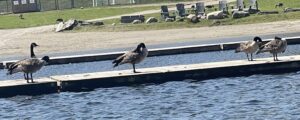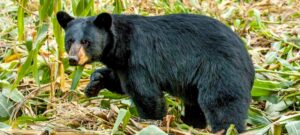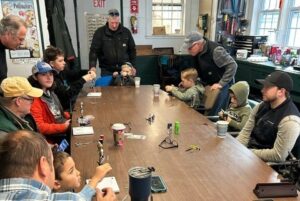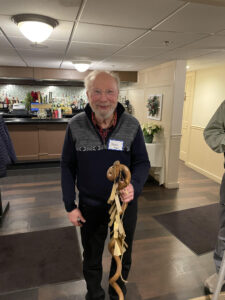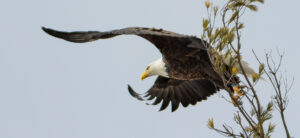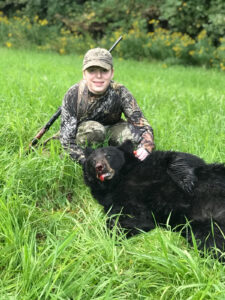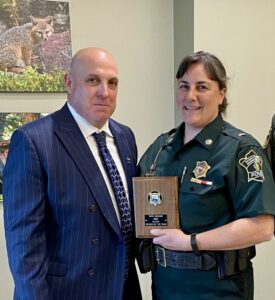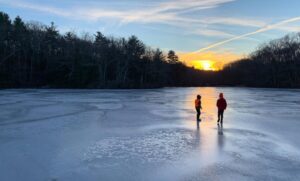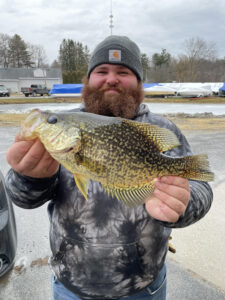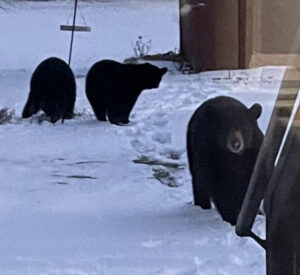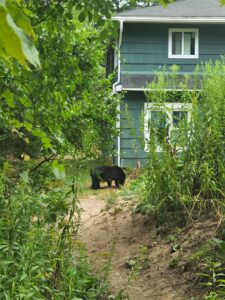“At this time, there is no evidence suggesting that Chronic Wasting Disease (CWD) is present in Massachusetts.” That was the good news given by MassWildlife Western District Supervisor Andrew Madden at the Berkshire County League of Sportsmen’s meeting held on December 5. In fact, none of the New England states have it. MassWildlife feels that once CWD is detected in an area, it is nearly impossible to eradicate. For this reason, keeping Massachusetts CWD-free is the best strategy to avoid the loss of mature deer, particularly bucks.
In case you don’t know, CWD is an emerging infectious disease that is fatal to free-ranging and captive animals in Cervidae, the deer family. CWD is one member of a family of diseases called transmissible spongiform encephalopathies (TSEs), and is thought to be caused by prions. CWD is the only TSE known to affect free-ranging wildlife.
Of the 50 US states, only the 6 New England states, New Jersey, Delaware, Oregon, Nevada Arizona, Hawaii and Alaska do not have it.
MassWildlife feels that CWD can have long lasting impacts on both the environment and the economy. CWD is a preventable disease that, if introduced, can gravely affect wildlife population health. When CWD prevalence is high, there can be shifts in the population’s age structure, where there are more young individuals and fewer mature deer. Additionally, studies have shown that CWD prevalence can reduce hunter participation, which can impact the outdoor sports industry and lower hunting license and permit sales. This reduces the funding for state wildlife agencies to conduct wildlife conservation and management. The disease can also be expensive to manage, with an annual cost for CWD positive states averaging around $773,000 in 2021.
To address parts of the CWD prevention strategy, MassWildlife has proposed recommendations which are awaiting public hearing, which include: 1) Sunsetting the remaining existing captive deer facilities in Massachusetts, and 2) Expanding deboning requirements to include all venison harvested outside of New England. The Deer regulatory hearing will be held on Thursday, January 23, 2025 at 1:30 p.m. and again at 6:00 p.m.
Black Bear November Season results
The second of the three black bear hunting seasons ran from November 4 through November 23. MassWildlife Black Bear & Furbearer Project Leader Dave Wattles reports that 43 bears were taken in the November Season. That compares with the 50 bears harvested last year which was the second highest recorded for that season.
The third Shotgun bear hunting season which started on December 2 ended last weekend. No harvest figures have been received yet for that season.
MassWildlife is making some bear management proposals. A Black Bear regulatory hearing will be held on Monday, January 27, 2025 at 1:30 p.m. and again at 6:00 p.m. to propose a change in regulations to lengthen the bear hunting season to include the entire interval of the current early season through the late season. The proposed season extension would create a continuous season from the first Tuesday after Labor Day until the end of the shotgun deer season. The change would represent a large increase in opportunity for all bear hunters and would be the most effective means of managing the expansion on the eastern edge of the range, given the high number of Archery deer hunters in the Wildlife Management Zones 9, 10, and 11.
MassWildlife will also propose the creation of a Youth Bear Hunting Permit which would allow youths 12 – 14 years of age to hunt bear throughout the season, without having to use the permit of an adult. The Youth Bear Permit could be used by youths 12-14 or 15-17 years old who have a valid Youth Deer Permit and Youth Bear Permit to hunt deer on Youth Deer Hunt day with a shotgun, thus giving them the option if they have the opportunity.
What happens to wildlife during a fire?
I don’t know about you, but every time I hear about a forest fire, my first thoughts are for the safety of people. My second thought is what’s going to happen to the trees, plants and animals. Will they survive and be able to recover? MassWildlife has addressed these concerns through a recent release which I am including in this column verbatim. Hopefully they will alleviate our concerns.
They start off by stating, “Plants and animals have evolved to coexist with the natural process of fire.”
With well over 600 wildfires occurring throughout Massachusetts this past October and November, many people are wondering about the impacts to wildlife. The answer is more complex than you might imagine. The ability of animals to survive fire depends on their mobility and on the uniformity, severity, size, and duration of the fire. Most landscapes are quite variable, with hills, valleys, and wetlands, all of which burn at different rates and intensities, leaving patches where animals can take refuge. Occasionally, individual animals may be hurt or killed by fast moving flames and heat. Yet, fire is and has been a natural part of the Massachusetts landscape and can bring a variety of benefits to habitats that in turn, benefit wildlife.
What do animals do during a fire? Most animals can readily smell smoke and move away from oncoming flames and heat. The impacts of a particular fire can vary greatly depending on windiness, the flammability of vegetation, the speed and intensity of a flaming front, or the severity of ground fire burning into organic soils. Our native wildlife have evolved strategies to escape and avoid the brunt of the flames and heat.
Birds fly up and away from the burning area or high up into the tree canopy. Larger mammals like deer, black bears, and bobcats readily move to areas of forest not impacted by fire. Smaller mammals like mice and voles retreat to underground burrows, while climbers like fishers and porcupines take refuge in treetops. Native rabbits may seek shelter in nearby wetlands. Amphibians and reptiles find safety by moving to wet areas or burrowing under the ground, logs, or rocks. Soil often provides insulation from the heat of fast-moving, lower-intensity fires. While some individual animals likely perished in the recent wildfires in Massachusetts, overall populations of wildlife are unlikely to be affected.
What do animals do after a fire?
The timeframe for animals returning to a burned area depends on the severity of the fire, the habitat, the season, and the type of animal. Certain beetles and other insects are the first to return as they are attracted to burn sites and use infrared sensors to quickly find burning stumps and other vegetation. Other animals return to a burned area within hours, days, or weeks after a fire. Owls, crows, turkeys, woodpeckers, whip-poor-wills, and other birds often return quickly to eat insects and acorns. Opportunists like foxes and hawks may return quickly to eat small animals that didn’t escape the flames.
Areas that have experienced fire will warm up quicker the following spring, and green up before the surrounding forests. White-tailed deer often come into recently burned areas for ash, minerals, fresh herbs, and tree sprouts. It takes longer for small mammals like New England cottontail to return. They often wait a few years for more cover to develop, but the shrubs and young saplings emerging after fire provide nutrient-packed food for these mammals.
Long-term benefits of fire
Periodic fires have been a part of the New England landscape for thousands of years. In fact, fires play an important role in rejuvenating vegetation and soils. In the months and years following a fire, many forest, woodland, shrubland, and grassland habitats undergo changes to the structure and composition of vegetation growing there. The result is a more diverse collection of native plants and improved habitat for wildlife. For example, fires can encourage vigorous growth of diverse native wildflowers, which in turn benefit a variety of native bees and butterflies.
Prescribed fire is a tool used by many agencies and organizations across the country to unlock the natural regenerative powers of fire. MassWildlife uses prescribed fire to bring forth the ecological benefits of fire without the dangers of unplanned, uncontrolled wildfires which pose risks to firefighters, people, and property. Wildfires can sometimes burn for days, weeks, or months and are known to generate long periods of harmful smoke. Periodic prescribed fires can reduce fuel build up in an ecologically sustainable way, as well as control and limit smoke production to a short window. Prescribed fires are carefully planned to meet natural resource objectives, provide for safety of the burn crew and the public, and minimize impacts to wildlife. Specially trained fire crews apply fire in pre-planned locations and sequences to ensure wildlife have escape routes and safety zones.
Merry Christmas and Happy Holidays!

